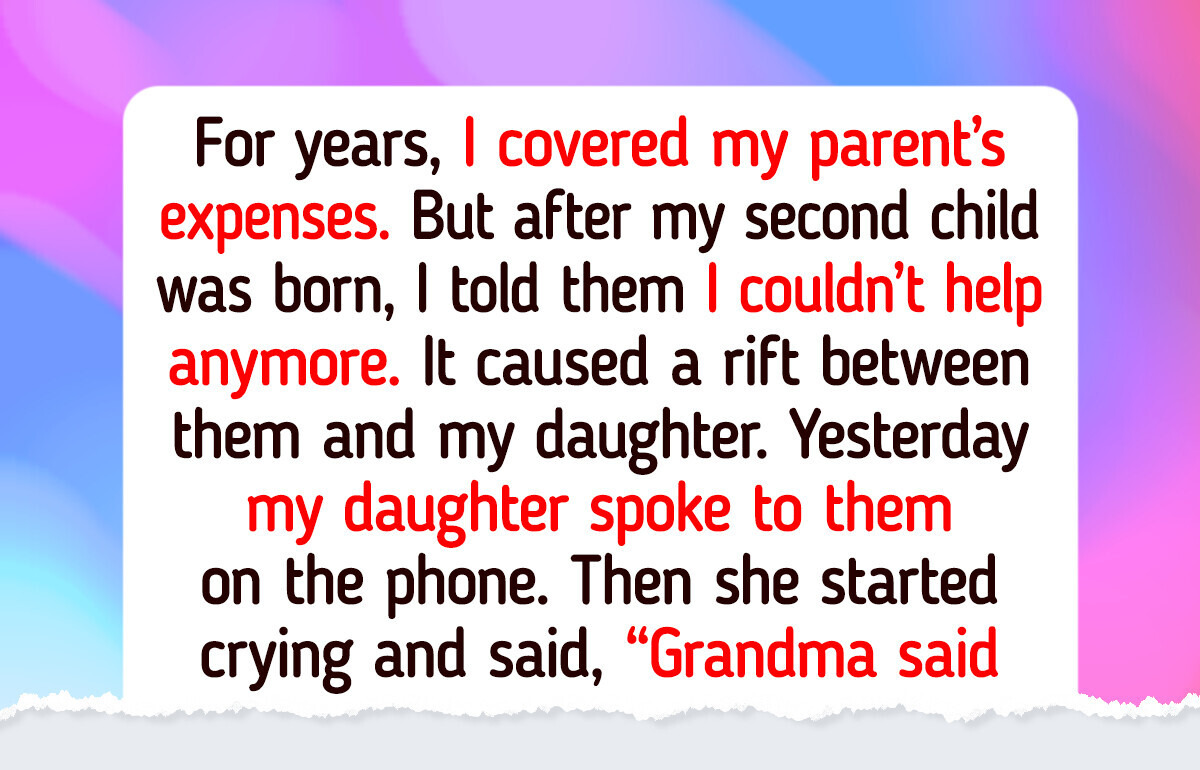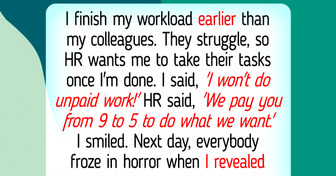Absolutely NOT!! Do not help them they manipulated a FIVE year old!! Stop for a min and look at your daughter. Who is more important? A pair of LAZY ENTITLED adults or YOUR INNOCENT daughter....it seems like a very easy choice to me!! Cut the losers off!!
I Refused to Cover My Parents’ Debts—I’m Not Their Bank

There is a chance for tensions to arise in any family setting. But when there are money and children are involved, things can get tricky. Emotions can run high and relationships could get damaged. One of our readers shared what happened between her and her family.
This is Kerry’s story.
Dear Bright Side,
I have always helped my parents with their expenses. It’s something I could afford for years and I had no problem paying their rent or buying their food or even doing repairs on their house. But things have not always been easy for my husband and me.
When our first child was born, we cut down a lot so we could afford to keep helping them, and it worked for five whole years. But our second child was born a couple of months ago, and I’ve been forced to reevaluate our expenses.
It quickly became clear that I wouldn’t be able to help them anymore, so I sat them down and told them that. I even showed them the figures. They tried to make me cut down on expenses like our grocery bill, saying that we could come eat by them more often.
But I wasn’t willing to take such a risk, especially not with a young child and a baby in the house. The discussion ended in an argument, and it caused a rift between us. One that extended to my daughter as well. They used to see her at least once a week; now she’s lucky if she gets a phone call.
Yesterday things got worse. They called and demanded to speak to my 5-year-old daughter, and when they hung up, she was in tears. I tried to find out what was wrong, but she refused to tell me what they said. That changed around dinner time, though.
I could see my daughter had been crying the whole day, so I tried asking her about it again, and this time she opened up. I was shocked to my core when I found out what my parents had done. My daughter said, “Grandma said people were there today to take her house, and it’s all your fault.”
She continued by saying, “She says you stopped helping with her rent and now she and grandpa have nowhere to go. You took everything they had.” I told my daughter that what my mother said wasn’t true. They were trying to turn her against me because they didn’t get their way.
But she’s too young to understand any of this, and it’s very hard to explain it in a way that will make sense to her. I called my parents this morning and asked them what they were trying to achieve, but my mom claims she was “just telling the truth” and that my daughter “deserves to know what I’ve done to them.”
I was furious and hung up, but my husband sat me down and asked if there was any way we could help them out of this mess. There isn’t. I’ve gone over the figures multiple times, hoping that I’ve made a mistake. And honestly, after what they’ve done, I don’t want to help anymore.
My husband thinks I’m overreacting and being unfair. He thinks I should find a way for our daughter’s sake. So Bright Side, am I wrong? Should I find a way, with the hope it will restore my daughter’s relationship with her grandparents?
Regards,
Kerry T.
Thank you for reaching out to us, Kerry. We understand how difficult this situation must be, especially with such a young child involved in it. So we’ve put together a few tips that might be helpful.
Protect your daughter’s emotional boundaries before repairing adult ones.
Your parents crossed a serious line by involving your young child in adult conflicts. Before considering reconciliation, focus on rebuilding your daughter’s sense of security. Explain that sometimes adults say hurtful things when they’re upset, but that none of it is her fault. Encourage her to share her feelings openly with you, and reassure her that you’re the one who will always keep her safe. Any future contact between her and your parents should happen only when you’re confident they’ll respect her emotional well-being.
Separate emotional guilt from financial responsibility.
You’ve supported your parents for years, far beyond what most people manage. You’re not abandoning them, you’re adjusting to a new stage of life with two children and tighter finances. It may help to document your budget again, not as proof for them, but as a reminder to yourself that the numbers are dictating this decision. If you feel pressured by your husband or guilt-tripped by your parents, show them the hard data. Facts can help neutralize emotional manipulation.
Redefine “help” in ways that don’t drain your resources.
If you eventually want to rebuild trust, consider offering non-financial support, like helping them apply for housing assistance, budgeting programs, or senior benefits. This lets you stay involved without putting your family at risk. But set clear limits and communicate them as final. Your parents may need time and boundaries to adjust, but you’ll be modeling something powerful for your children. You’ll show them that love doesn’t mean self-sacrifice at any cost.
Kerry’s situation is not an easy one to deal with. But if she can’t afford to support her family as well as her parents, there’s really nothing she can do. But she isn’t the only one who has financial struggles within a family setting.
Another one of our readers reached out to share their situation. Read the full story here: I Refuse to Give My Retired Mom My Hard-Earned Money.
Comments
Related Reads
I Refuse to Do Extra Unpaid Work Just Because My Coworkers Are Incompetent

I Got Fired for Refusing to Let My Boss Humiliate Me in Front of Everyone

15 Times Kindness Showed Up Exactly When It Was Needed

12 Life Moments Where Quiet Kindness Played the Main Role

14 Quite Acts of Kindness That Changed Someone’s Life Forever

12 Moments Where Empathy Showed the Power of a Kind Heart

15 Moments That Prove Kindness Is the Thread Holding Life Together

19 Heartbreaking Blended Family Stories the World Needs Right Now

15 Stories That Prove Some People Live in a World With Totally Different Logic

I Refuse to Spend My College Fund on My Stepsister’s Wedding, She’s Not Even My Real Sister

10 Times a Moment of Pure Cruelty Was Actually a Secret Act of Kindness

HR Fired Me Right Before My Vacation, So I Used It Against Them






